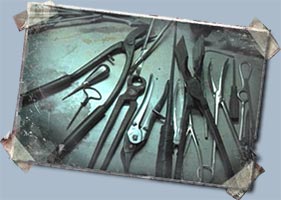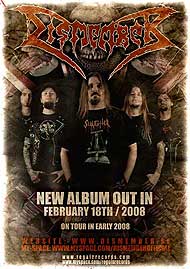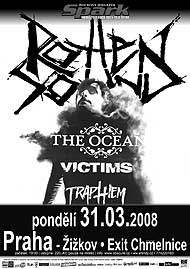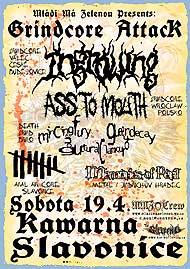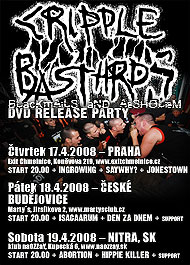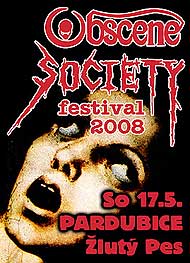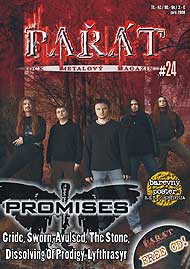04.10.06 text: Ada pics: Tom |
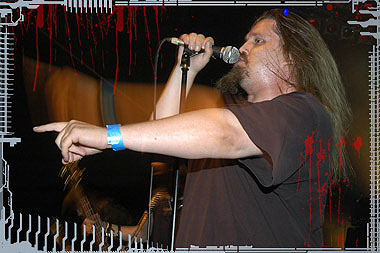 |
|---|---|
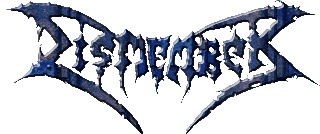 |
|
IN AN EVER TOURING STREAM · DEFYING CENSORSHIP - DEATH METAL FOREVER ·
HORRORS OF WAR · KILLING TRENDS |
TEN YEARS AFTER THEIR LAST SHOW IN THE CZECH REPUBLIC, EXPECTATIONS WERE HIGH FOR THE RETURN OF SWEDISH DEATH METAL‘S UNDISPUTED KINGS. DISMEMBER CAME BACK TO PLAY THE OBSCENE EXTREME FESTIVAL WITH A GREAT SOUND, REFINED STAGE PERFORMANCE, AND MOST NOTABLY WITH ENERGY AND DRIVE TO KEEP PLAYING YEARS TO COME IN THE WAY THEY HAVE BEEN PLAYING FOR EIGHTEEN YEARS. DURING AN EXTENSIVE INTERVIEW WITH THE WHOLE BAND, ADOLF AND MARTIN TALKED ABOUT MOTIVATION, LABELS, CENSORSHIP, BUT MAINLY ABOUT THE COMMITTMENT NEVER TO GIVE TO TRENDS AND KEEP PLAYING, AS THEY SAY, UNTIL YOUR FUNERAL.
IN AN EVER TOURING STREAM
One may think about which bands should be labeled with the noble title of death metal kings, and so we discussed back and forth for quite some time. There have been many genre defining bands that established the death metal trademark; however, we started to think who has endured playing since the early years until today without a break or musical change. Yes, there are bands who came back in the last few years but think for yourself who else beside Dismember has never left the death metal world while still releasing records that you would call death metal ones.
The Czech metal fans have not been lucky for Dismember to play in the past ten years but the band is doing series of shows all the time to keep its momentum going …
“We are touring all the time,” says Fred, “but we are doing shorter sections and try to take territory by territory so that we get the connections again with the people. We are booking everything ourselves and we do all the business ourselves. We don’t have a management, no booking agent or anything, so we try to connect with people who like to help us out for a longer time because we want to do this for the future too, and not just for now.” Matti adds: “A lot of touring follows this year and also between tours we will start to do new stuff. “Write new songs,” continues David. “Everyone has a few riffs here and there to put it together.”
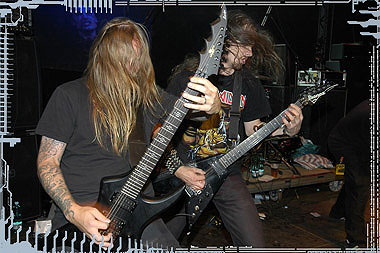
A word is out about the new Masters of Death tour with Entombed, Grave and Unleashed …
“It is going to start on November 3rd until November the 19th,” Fred says. “Then we will see what is going to happen after that. That’s just the start for this package and we will see what happens after that.”
You have been in the scene for 18 years. What keeps you still motivated?
Matti immediatelly replies: “The music. We just love to play this music and we love to play live. Doing a live show is just fucking excellent when you have a good response and you see people really enjoying the music. That gives you so much energy and just keeps you want to do this forever. We live for this. I won’t say we are 100% studio band; we do have to do albums but Dismember is 100% alive playing live. It is that thing that keeps us going.”
The three of you have been together in the band for the whole 18 years. How do you manage to do that?
David jumps in with a quick joke: “We hate each other.” That sets the whole band laughing to prove that the relationship is far deeper than just a professional musicianship.
Matti explains: “I think it just comes down to common sense and just try to respect other members. Everybody has his own bad sides and you learn throughout the years to keep away when somebody is in a bad mood and just respect. “
Have you realized that it also takes a lot of luck to have three of you stay so long together?
After a two-second pause, Fred and David say both at exactly the same time just one word: “Absolutely!” This coincidence makes us all laugh and Fred adds: “I don’t think we have to say more. “But we fight sometimes,” continues David. “Of course, we have different opinions but in the end, our personalities mix pretty good together. We have very good sense of humor and we actually have a good time. We really like to go out and do all the shows and we actually have very much fun. It’s now very much to the personalities and humor we have because you can meet other people from Sweden or wherever and you are connecting but totally I think a lot of it it’s relaxed because of humor and having a good time.”
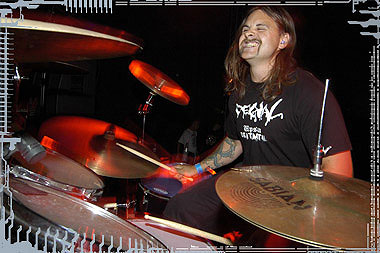
“As David said today,” continues Fred, “actually we went to this show he said ‘we always have a good time’ but we say that often that we still have a good time, we always do. We laugh a lot. It’s not like we are sitting in different places or anything, we’re always together.” David adds, “For example, today we were sitting in a van for eight hours. There are moments when we are not talking – one is sleeping, the other one is reading but in the end, we will have a good time together. We have our very dry humor all the time. We are picking on each other’s enough, but it’s in a friendly way.”
Then why has David Cabeza, your long-term bassist, broken that long term relationship and left the band?
Fred explains: “He has had his leading his life. Once he had problems and we had problems in the band then, so he shows to leave the band and we continued and then he came back because he wanted to. After that he has created a family in the U.S., so it’s natural for him to leave because we cannot have a bass player who is located in the U.S. It’s not going to work.”
How did Tobi and Martin, the two members joing in later years, adapt to the rest of the band?
Matti comments: “First, we started to treat them like shit because they deserve it.” Additional laughs are keeping very friendly atmosphere. “No, they are very nice guys and that is the thing with Dismember: every time we tried out somebody for the band, we always look at how they act as persons. Musicianship is second; personality is first. Somebody could be the best quitarist on the planet but a total asshole and then he wouldn’t work in Dismember. We need decent people to get the chemistry working and then we can do something good.” David continues: “I would say it’s very important on stage too that a member is good on stage. He shouldn’t have a guitar like this [David pretends to keep a guitar very high above hips] and just stand like Paul McCartney.” Another set of laughing follows, cementing the good mood. “No, but that is a very important part of the show as well,” closes David.
Having such a good relationship in the band, do you meet outside your music duties?
“Sometimes,” starts Fred. “We are out so much playing, so it’s quite natural—Fred and Matti they have families and kids—seeing each other in a rehersal room and a tour bus or hotel. But we do get along very well, everybody.” Matti is pulling out another joke, aimed at David: “Of course we always gather around some and drink beer. That’s very important part of the musician life.” David smiles back, being the one who does drink alcohol, which leaves me to get the point about the maximum tolerance he must have for aftershow parties.
DEFYING CENSORSHIP
You had some difficulty in the early days and had to go to the court in England because of your artwork in the first album and won the case to pave the way for many bands to follow. Can you remind the legendary story?
“We had to go to court in England because of the Skin Her Alive song from the first album, starts Matti. “There
was a shipment of albums to England from our record label at that time, and the customs just went through it like a
routine check. They saw all these albums, pulled out our album, looked at it, and on the back cover, there was this
picture of us in blood. They went like – What is this? It looks dangerous! They looked at the song titles, they saw
Skin Her Alive, and read the lyrics. That was the reason then for bringing us to court because you can’t bring anything to
the United Kingdom that is indecent and obscene. That was the inspiration for the second album title
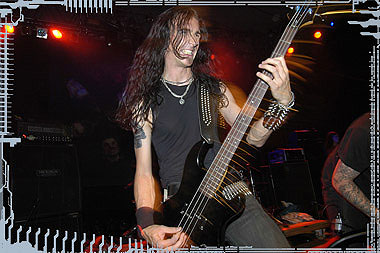 but the damage was already done. The album had been out for more than six months and it had been playing on the
radio and everything. The customs didn’t win the court case. We got a lot of inspiration for the next album from
the court thing.
but the damage was already done. The album had been out for more than six months and it had been playing on the
radio and everything. The customs didn’t win the court case. We got a lot of inspiration for the next album from
the court thing.
Have there been any implications or consequence for you from the court case?
“Nothing,” explains Matti. “If you look in the English Court Books, you’d have the case English Customs against Plastic Head / Dismember, and the Plastic Head / Dismember won the court case and wasn’t banned from the U.K. Every time that thing comes again, lawyers would always refer to that case. We do not have any more troubles with that.”
DEATH METAL FOREVER
Has there been any pressure from outside or from within the band to change your music?
David quickly starts to kill off my picky question with another joke: “We were ten years ago to try this Euro Disco [another burst of laughing] but it didn’t work out. Matti couldn’t sing that, sorry.” More laughing follows and David adds now seriously: “No, there’s never been any discussion on the change over the music.” Matti further adds: “The only pressure we had to change was from our old record label [Nuclear Blast] because they actually told us right out ‘Guys you can’t do this anymore, death metal is dead! You should change, you should become more commercial.’ We just got pissed off and that’s why the 1997 album is called Death Metal, as a big fuck-off.” Everyone smiles at that expressive statement, being glad that this period is long over. “We thought that our record label shouldn’t tell us these things, they should support us. We didn’t have a title for our album at that time and Fred came down one day to the studio and said ‘I’ve been thinking about the album title and what if just call the album Death Metal?’ Everyone was like ‘Why not?’ That was also a statement because death metal was going down because black metal was coming up and all that melodic crap was also starting to rise. So that was the statement for us that we believe in our roots and in what we do.”
With such scepticism, Nuclear Blast probably has not done much promotion and support for the last two albums Death Metal and Hate Campaign you released with them.
“For Death Metal, there was not much of a promotion for that album,“ Fred explains. “We were totally left in dark by the label and for Hate Campaign it was even worse. Then we actually toured more because we toured the States but it didn’t work out because nobody actually pushed it. The label had bigger fish to fry.”
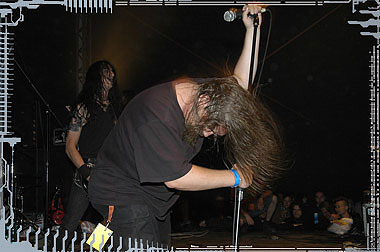
Having left Nuclear Blast, you went to a small label Karmageddon Media but only to release one album Where Ironcrosses Grow. What happened to Karmageddon Media that you left them after releasing just one album?
“I don’t know what happened – I still want to know what happened to them,” Fred wonders. “They actually totally disappeared and made a lot of bad decisions. The label is almost non-existing these days. It’s not our fault: we had to save ourselves. We had to do something and they did not do anything for Dismember actually that they should have done, or said that they should have done. Their distribution was lacking and they suffered a lot of consequences for what they probably did in the past. I don’t know but that’s what we think.”
Dan Seagrave has been your artist drawing this and other album covers. Does he also like the music you play?
“He is totally interested in the music,” Fred explains. “I don’t know how much he is actually into it, like, if he is listening to it every day, but I know he likes it and thinks it’s cool. We kept contacts since the Ironcrosses album and he is professional and very cool to us. He is a very good guy to work with. Matti had the idea of the whole cover. It was very easy for him to talk to Dan and he just helped him out.
I realized that Fred or Matti have written music for certain songs just on their own. Do you guys play also guitar to write songs?
“I don’t play much guitar but I can do music,” starts Fred. “It’s the same with Matti,” follows David. “I don’t think he could go up and play a Dismember show on quitar but he can make good riffs on quitar. It’s the same with Fred.”
The word is out that you became professional musicians, is that correct? Is your job now a full-time musicianship?
David confirms: “Yeah, that’s right,” while Martin adds: “Our job is to headbang.” More laughing follows, and David comments: “Yeah, we do it [headbanging] a lot besides stage too, believe me.”
What does it take to become a professional band? Does it force you to sell more CDs?
Matti explains: “I think it’s more about how you behave live. I mean if you go to a live act you get more shows and the more shows you do, the more money you make. I don’t think at this moment anybody in the scene can live off record sales. So I guess being a good live act is really important and that just comes naturally for us because we love to play live and we just give 100% when on the stage.”
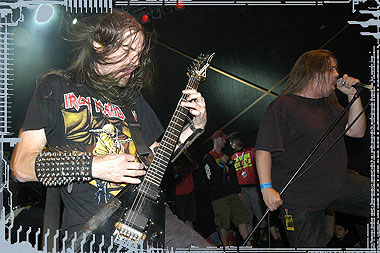
What is the idea behind re-releasing most of your albums with Regain Records?
Fred says: “Me and David took all the material we could find and went through it all and re-mastered everything just to make sure the albums are out and also that you have some kind of bonus material. So it’s a little more interesting to buy it again if you already have it. Also to keep the quality good because some of the albums have been good but if they are out of stock, it’s impossible to get it. Now we had the time, after many years, to try to re-master just to make sure it sounds as good as it should.”Have you re-mastered your Early Demos as well?
“Definitely,” laughs Fred, ”because they were never mastered. They were just on cassettes.”
It’s in the air that you are getting ready material for a new DVD. Can you say more details about that DVD?
“Not at the moment,” Fred explains. “We have saved so much material. We have filmed so many shows, today too, that it’s going to be on the DVD perhaps three disks”. David adds: “We do a lot behind-the-scenes stuff, drinking after the show, and there is still other stuff. As you’ve noticed, we are this kind of band: We don’t have to keep an image to the fans – we are pretty relaxed guys and we have very dry sense of humor.”
Speaking of your image, David, you used to wear those spikes on your arms but don’t do it anymore.
“That was in the early years,” David answers. “I just stuck to these normal wrist bands, the Judas Priest stuff. I stopped wearing these [spikes] because I hate Kerry King [of Slayer] so much.” Laughing explosion follows. “No, sorry, I just prefer to wear these wrist bands without any spikes. I think it’s more for Black Metal bands too to have this more extreme stuff than just these studs.”
HORRORS OF WAR
To a person not knowing your lyrics, the album title Where Ironcrosses Grow may suggest a link to the nazi army – the iron cross being a symbol for Nazis. Has such misinterpretation ever occurred?
Matti is very clear: “No. There have been questions, kind of curious questions, but no accussations or anything because the lyrics are not about the Nazi movement. Where Ironcrosses Grow is about the horrors of war, and actually, the iron cross for me is more from the First World War than the Second World War. But the song is just about being on the front line and seeing your comrades getting killed, and surviving through that; and you are just a wreck as a human because you are seeing your friends being killed and blown to pieces. It’s just about the horrors of war; that has nothing to do with politics. We are not a political band, never been, and never will be. It’s about the victims of war.”
Where Ironcrosses Grow
Death is all around me, violence and decay
Screams of the dying, never leave my mind
Hanging helpless in barbed wire, another helpless victim
Cut to shreds in the rain of fire, bleeding, burning, suffering
Where blood and iron flow, the iron crosses grow
Piles of dismembered corpses, slaughtered and twisted
Unseeing eyes, staring into nothingness
Where does your inspiration from the wars and battles come from?
“It just came early when I was a kid,” says Matti. “I started to read, and I read a lot, and read these war novels because there were real easy reading. I started out with those and then I just got interested in history. I have a Finnish heritage, and my home country has been at war in the Second World War. So, I got interested in that, and after that, I just kept on reading. I read so much, so obviously I have to do lyrics to get some things out of my head. I like to read the stuff about how it was to be on the front line. So, still no politics: I don’t have an opinion that nobody is wrong, nobody is right. I think it’s just insanity. I’m still amazed like the Second World War is that it’s the biggest fucking meat-grinder on this planet. You had the First World War but I mean the Second World War – there were so many other things like the Holocaust and the insane battles on the eastern front. So many people died that it’s so fucking amazing.”
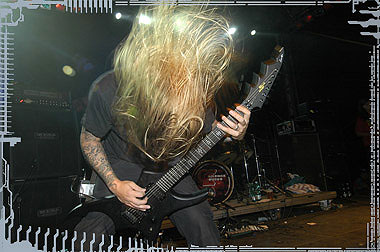
What do you have in mind when writing lyrics? What should your lyrics have or should not have?
Matti starts, “For me when I do lyrics I want to do those kind of small stories like Iron Maiden does because that’s still my favorite band and I love to read their lyrics. You can always trace about a movie or book they’ve been reading on tour. I like to do those small stories. One thing that we decided long time ago was that we never will do anything political because we don’t want to make that standpoint. We do have political opinions but we don’t bring them to the music – it’s strictly personal and has nothing to do with the music. So, we stay away from that.”
And what about the song Blood for Paradise. That sounds a bit like catching the political theme, being inspired by the fundementalism in the Middle East?
“Yeah, it kind of is but it’s not in a political way,” replies Matti. “It’s very much about religion – but then again, religion is politics now there. We are out from Sweden where religion is not politics. But in that region, it is. I think it’s fucked up: How can somebody get so fucked up because of religion that they start to kill out other people? I think that’s horrible.”
In the song Mistweaver of the Death Metal album, you wrote very brutal lyrics starting with ‘I put the 9mm glock to your head and gently squeeze the trigger blowing out your brain.’ Have you ever faced other censorship issues with songs like this one, having in mind the killings in US schools, later supposedly related to wrong musical influences?
“Actually nobody has mentined that song but you,” comments Matti. “This is the first time that someone brings that song up. I know the lyrics are extreme. I had this time-in-my-life: We were in the States on tour, and I bought these books about serial killers. I was just reading a lot about different serial killers, and it just amazes me how you can be so fucked up in your head. When I did those lyrics, I tried to go inside the head – how can somebody be like that and what makes them take that. I just—kind of like an actor gets into this port and acts his part in a movie—I went in and just wrote the lyrics, perhaps a way like a serial killer or killer would think. But I have never has problems with this song ever.”
Your lyrics have matured over time and got focused more to the war-like themes than the classic horror stuff. When you read your early lyrics such as Soon to Be Dead or Skin Her Alive, what is your feeling today?
“Actually those two songs are still very valid lyric-wise for me,” replies Matti. “If you look at the songs like Dismembered or Sickening Art, that is more like – what the fuck – but exactly those two songs have valid points still. I mean throughout the years when you are in the music business, you speak English all the time, your English and vocabulary just develops, as you get older you start to look at things differently. I have a family and that was a big eye-opener. I like to write small stories about strange things. I read a lot of strange stuff and just like to make those small stories.”
KILLING TRENDS
Your famous quitar sound, the death-metal crunch: back in the early days, was your intention to sound in the same brutal way or to differentiate and compete from others?
“There was never competition,” explains David. “We just have the same influence and just like the same quitar sound. We use the same pedals from Boss, this Heavy Metal pedal, and the same amps so it’s quite natural.” Fred adds: “I think we had a very strict mind to what death metal should sound like. When we played it like we did, both us and Entombed or Nihilist, we were very strict and you cannot let anything slip anywhere. I think that Dismember still has the same opinion about it that we would never trade that quitar sound for anything.”
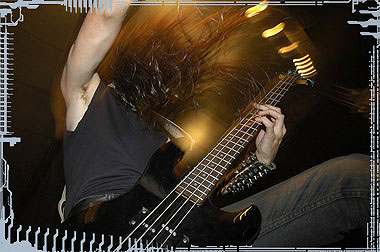
You have never tried any triggered drums or digitized guitars, which became popular with some other bands. Why is that?
David addresses my speculation, “I think it doesn’t belong to this kind of music. Where this music comes from is – it’s the same with black metal, too: If you put a trigger on the bass drums and keyboard parts and orchestra parts, it doesn’t fit the music. It’s because we play the old style and I don’t see any point of using a trigger and keyboard parts. This is just straight-forward stuff we play. I couldn’t think of Fred playing with a trigger.” Upon a David’s chuckle, Fred jumps in, “No, no, no. It would also be like giving up on your early influences and we still have the same influences: We still love Autopsy, Possessed, Death – the early albums. It would be like saying that we don’t care about that music anymore. That would be saying that we don’t care about our own music as well. So if we started to change the sound that way, we wouldn’t be the same band.” Matti affirmatively states: ”It would be like pissing on your Mother’s grave [he chuckles] – to be obscene and extreme [Matti swiftly adding the festival’s name].”
Are you not afraid that overusing melodies may lead to some fans thinking that you go away from your brutal and fast songs?
Fred is very clear: “We are not going away from the brutal and fast songs. The last album, the one song that David wrote – how long was it? 1:48 or something, one of the shortest songs we ever wrote, one of the fastest too.” David continues: “But I get your point: On the other hand, in 1992 we already began with these melodies, with these twin quitar harmonies. We have been playing it almost the whole time. But I’ll always say that we do have these Iron Maiden influences but it would not get too much of that. We’ll keep it raw and aggressive. Of course that’s the main point but we do have, both me and Martin have, quite melodic solos too. Fred says: “It’s part of our sound. We are not going to erase that or anything just because some people are complaing of melodic parts. But it’s not melodic straight-through.” David fills in: “Another thing we do different than other bands too: When we have these melodic parts, they are always instrumental – Matti doesn’t sing on these like many other newer bands, the Gothenburg scene; they usually sing at these parts. We have them separatelly – these galloping quitars in the background and then the separate part of the song.”
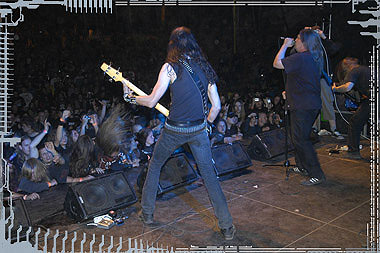
Some people may think that you aim to get more listeners with melodic parts to do your music more accessible.
Fred swiftly comments: “We don’t strive to get more listeners; we just try to actually make clear what our influences are. Iron Maiden has always been our very big part of Dismember sound. Even for the first album, some parts that perhaps with that raw sound it wasn’t really that clear but we still have the influences. We always listen to Iron Maiden, all of us. That was a very big influence, but perhaps we didn’t have the ability to make it clear that it was actually an influence. But it’s not that we started to approach more melodic part for Dismember to have more listeners. It’s not like that at all.”
Fred, you now produce and mix the albums exclusively. Do you think that getting an independent producer would help to get a different angle to the music?
“That’s true,” admits Fred. “But it’s kind of hard to get into this band. We have used other engineers and technicians but we will see about the next album, how we’re going to do it. From album to album, we decide how to do it. Sometimes it’s hard to get into this entity [Dismember] because we’re kind of, we are so much alike and we know how to do an album these days and how we want it sound. So, it’s kind of hard to let somebody else from the outside to start re-arranging stuff. See about the next album. I think it’s always interesting to just to have the thought of having somebody from the outside getting to see what he or she could do about it.”
IN THE EVER FLOWING STREAM
What is your recipe for death metal to survive, say, another ten years?
“Just continue to do what you do,” starts Fred. “And like it,” David jumps in, “don’t follow trends,” he closes. “In the late nineties,” Fred continues, “it was kind of tough on us and other bands. The ones that did survive were the ones who didn’t give a fuck – just continued because they had fun doing it. I think that’s the best recipe. Don’t listen to others. Do not try to change your style if you have the style.” David pulls out a good comparison: “Listen to Iron Maiden in the 90’s: They didn’t change their style either on the grundge stuff and they kept on doing their style, which they are still doing. That’s the same with us.”
Do you have any long-term vision or plans for the band?
Matti responds (on purpose in a very deep voice): “Go with the flow and see what happens”. “It’s like an everflowing stream,” Martin adds to general smiles back. “No, but I mean, we always think about the next album and trying to get more shows,” Matti goes on,”We never thought forward that much – I don’t think, so we have always had our wait-and-see approach. See what happens and adjust to that.”
Is there any message that you want us to share?
“No, but we will do this,” Matti replies, and the whole band—Matti, Fred, David, Martin, and Tobi—stand up, arms around each other, and start headbanging – all five of them at the same time. They pay their headbanging tribute to the fans, to the music, to the scene. This amazingly sincere gesture gives a clear message: we have fun doing this, and we are happy if you like it. Being moved by this unexpected finale, we both feel as if to bow deeply in a reply to say: thank you for all these amazing eighteen years – we will keep supporting metal the way you have always been.
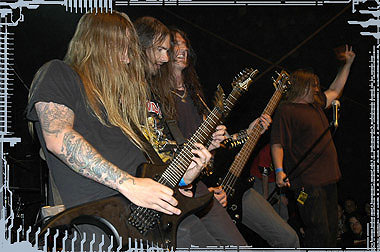 Dismembered (demo 1988)
Dismembered (demo 1988)
Last Blasphemies (demo 1989)
Reborn in Blasphemy (demo 1990)
Like an Ever Flowing Stream (CD 1991, Nuclear Blast)
Pieces (EP 1992, Nuclear Blast)
Indecent & Obscene (CD 1993,Nuclear Blast)
Casket Garden (EP 1995, Nuclear Blast)
Massive Killing Capacity (CD 1995, Nuclear Blast)
Misanthropic (EP 1997, Nuclear Blast)
Death Metal (CD 1997, Nuclear Blast)
Hate Campaign (CD 2000, Nuclear Blast)
Live Blasphemies (DVD 2004,Escapi Music)
Where Ironcrosses Grow (CD 2004,Karmageddon Media)
The God That Never Was (CD 2006,Regain Records)
Matti Kärki – vocals
David Blomqvist – guitars
Martin Persson – guitars
Tobias Christiansson – bass
Fred Estby – drums
